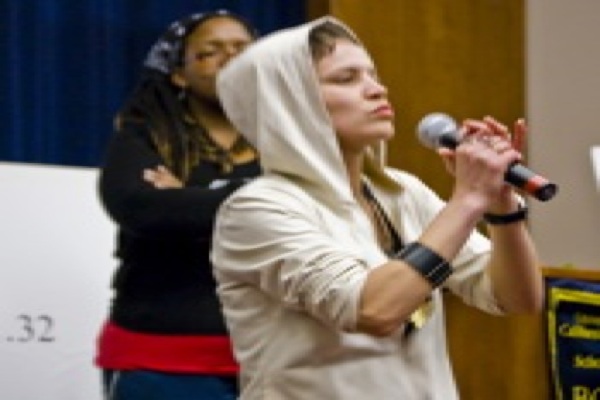Po Mamaz – a media advocacy segment of the welfareQUEENS
Po Mamaz – a media advocacy segment of the welfareQUEENS
 |
|
by JewnBug, Media facilitator: Wendy Fong Today is a new day. Poor skies lead to rainy days, but poor skies say goodbye lead to better days sometime. better days sometime in the neighborhood welfareQueen in tha house! PoMama, poverty scholar gonna break it down how indigenous families mutated to inter-dependency in this blood stained land of America how the childcare system needed funding instead built prisons destroying our families but with thumbs up votes to Obama's economic plan there will be increased money for 2009 no more rainy days for now… I had the privilege to facilitate this column interview with Jewnbug, co-founder of the F.A.M.I.L.Y. Project, founder and executive director of A.R.T. (Artistikal Revolutionary Teaching), Parent Voices (grassroots, state-wide with 18 chapters in California), a Po'Poet, poverty scholar, welfareQueen, POOR Press author, and PoMama columnist, about child care in California. Her voice was vibrant and fierce, a womyn beating to a thousand of her own drums. I was eager to hear about the good news and future plans in childcare. When President Obama signed the Economic Recovery and Investment Act for 2009, it granted $2 billion for federal childcare funding. For the past 7-8 years the federal government has not increased funding for the Child Care and Development Block Grant (CCDBG), a program designed to support families by increasing quality, availability, and affordability for childcare. This has been the largest increase in federal aid since Washington began to spend money on education after World War II. California is populated with the most children compared to all fifty states. From this act, the state will get approximately 12 percent of the $2 billion funding. When broken down, about 75% will go towards certificates or vouchers, allowing more availability for children and parents to selectively access childcare, 4% towards improving quality care such as teacher training, and 21% towards licensing. The plan will also increase funding for the Headstart Program over the next two years, which is the largest federal source for childcare funding for children under five years old. Today over 200,000 children are waiting for childcare on the Centralized Eligibility List with no guarantee of childcare. Yet, what are parents and children expected to do in the meantime? “Basically parents are getting penalized by not fulfilling their welfare requirements of finding a job and fulfilling a certain income bracket,” says Jewnbug. However, when the additional funding arrives, part of it will help alleviate waiting, helping families find jobs, and create new childcare jobs. However, although this is good news, Jewnbug says she is also challenging the system from its foundation, asking how did childcare get so neglected in the first place? How did America suffer from such a deficit for infants, toddlers, and children? First, we have to re-examine the idea of family, the idea of childcare, and how the indigenous childcare model has changed to a corporate, interdependent model in America. Indigenous childcare was where everyone used to take care of their own children, everyone learned together “for the people by the people.” All ages learn together, playing together in a community of family and eldership across multiple generations. In the United State, when a child reaches 6 months, or even 3 months old, the mother is expected to go back to work. “This is corporate child abuse,” says Jewnbug, “it promotes a separation of mother and child. Being a parent as a job is considered by Calworks as being below the poverty line. Why are parents not paid for taking care of their own children?” She references Dr. Wade Nobles, a tenured professor in Black Studies at San Francisco State University, who talks about how Western or Euro-centric ideology is centered on individuality, which promotes this separation by of parent and child. He states individuation argues that “you’ve got to break free from your family... that you have no independent agency because in their minds you are submitting to the thinking of or the feelings of or the ideas of these other individuals.” It is a political idea that is reinforced by capitalism, where it thrives on the exploitation of people to maximize profits. How does our childcare system relate to the prison industrial complex? “It was a set up,” says Jewnbug, “Did you know that they project how many beds to build in prison based on the 3rd grade literacy?” Jewnbug is also working on a few key things she hopes to see occur during the allocation of these funds. One key thing is that the governor doesn’t steal the money from the childcare funds. If the funds are not spent over the next two years, it will automatically roll over into the next fiscal year making it susceptible for the governor to grab it. Thus in order to prevent rollover funds, they are attempting to create child care vouchers or a Rainy Day Account, also known as reserve accounts to save funds during economic recession. Also that the state requires child care facilities to get inspected annually, compared to every five years as they do presently. Federal money will be increasing the CCDBG, which was funded for 8 years. That money needs to trickle down to 12%. That funding combined with the other funding can use childcare vouchers for private child cares-- anything of their choice. |



